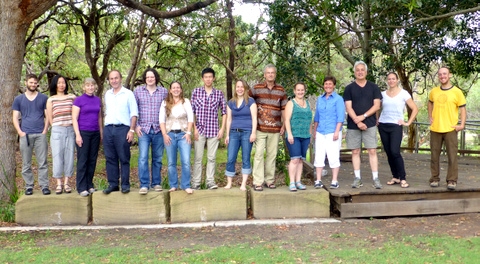Working Group participants (left to right):
David Finnigan (independent, Australia and UK), Shuang Liu (CSIRO Ecosystem Sciences), Virginia Dale (Oak Ridge National Laboratory, USA), Mike Young (University of Adelaide / Harvard University), Jochen Renz (Australian National University), Simone Maynard (Australian National University), Harry Lee (Independent, Australia), Ida Kubiszewski (Australian National University), Jeremy Russell-Smith (Charles Darwin University), Petina Pert (CSIRO Ecosystem Sciences), Sue Ogilvy (Australian National University), Bob Costanza (Australian National University), Kat Grigg (University of Queensland), Rick Ziegler (USA EPA, Washington DC).
Other participants: Karim Chichakly (ISEE Systems), Steve Farber (University of Pittsburgh), Scott Heckbert (University of Alberta), Piotr Magnuszewski (Centre for System Solutions), Neal McDonald (University of Maryland Baltimore), Richard Tran Mills (Oak Ridge Climate Change Science Institute), Lisa Waigner (University of Maryland)
Last week saw the convergence of some very different worlds: creative artists, ecological economists, spatial analysts, land management experts, a playwright and a game designer participated in a workshop to create a game – but not the type of game you’d play at a Christmas party.
This Working Group is the first one to be funded by two synthesis centres: the Australian Centre for Ecological Analysis and Synthesis (ACEAS), a TERN facility; and the US National Socio-Environmental Synthesis Center (SESYNC).
The games being created by this diverse group will combine elements of choice modelling, ecosystem modelling, and interactive multiplayer games to capture the economic values people hold for ecosystem services.
Game players will be able to ‘play’ the system to create their version of the ‘best’ landscape. In doing so, the players will actually be reflecting how much they value ecosystems services, such as large shade trees in a city, and what tradeoffs they would be willing to make in very tangible ways.
Led by Dr Robert Costanza, a leading ecological economist and Professor of Public Policy at the Crawford School of Public Policy at The Australian National University, this innovative ACEAS workshop will help ecologists and economists model the value of ecosystem services, and hence impact on decisions around land use, development and management.
‘Ultimately, we would like the system to evolve to one that would be extremely engaging and can be played by many people simultaneously over the web.’ If successful, this will create an innovative research environment that will greatly advance ecosystem services science.
By using a game, scientists and economists are able to test how important different landscape outcomes are for the players.
Since the model embeds the trade-offs, such as those between better ecosystem functioning and more population and urban land use, the choices the players make will reflect how they value these trade-offs. Unlike conventional choice experiments, this new approach will allow the players to create their own scenarios. Rather than working with a fixed set, preferences will emerge as a result of individual learning about the consequences of their decisions and group interactions.
By playing the game, players will become informed about the trade-offs in a much more tangible way than through simple description and their preferences and choices will evolve. In the game environment, all the choices players make can be recorded and analysized.
The system thus connects the best of choice experiments, social interaction, and dynamic modeling. The workshop is part of a larger initiative to provide useful input to decision-making and creates the added opportunity to engage specialists in human-computer interfaces with psychologists, marketers, game designers, modelers, and policy-makers to enhance approaches for generating collective intelligence through interactive gaming.
More information on the workshop can be found on the ACEAS webpage and the National Socio-Environmental Synthesis Center website.
Published in TERN newsletter December 2013







